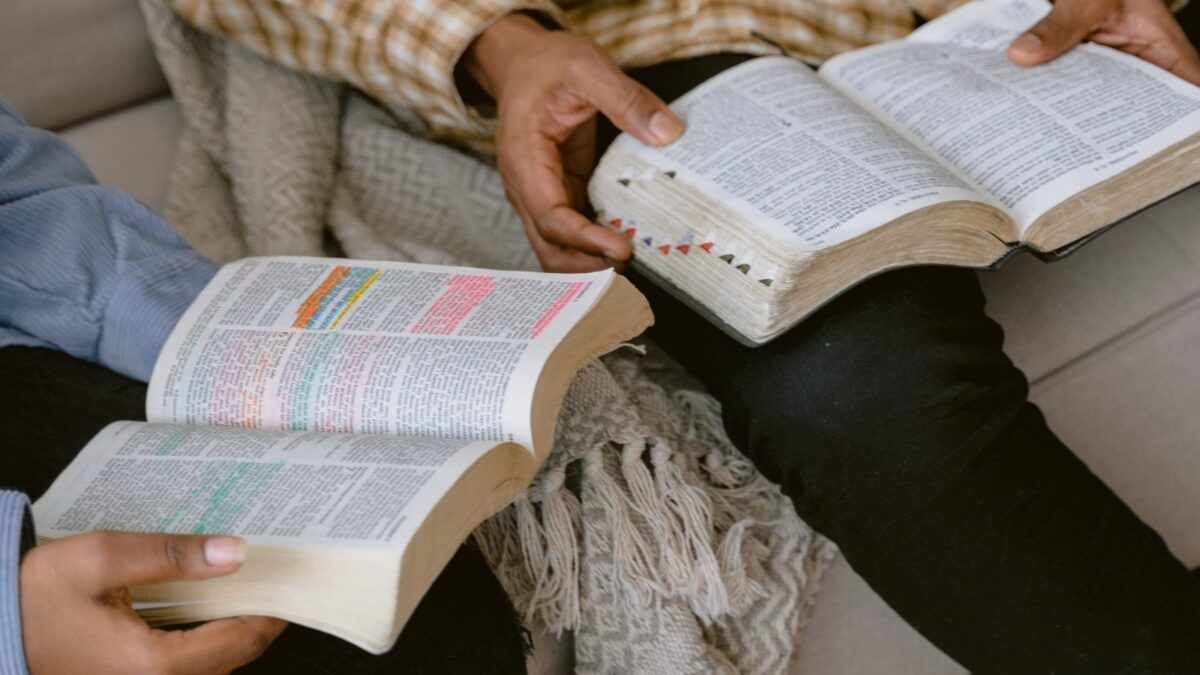Since Recession Christmas is almost here, I hope we’re all ready to play a Yuletide game normally reserved for impoverished college students and gambling addicts — Christmas Cash Reimbursement. In case you’re not familiar, this is the game where you pile up all the Christmas money people gave you as gifts and then watch your joy melt into a puddle of sorrow as you remember that you won’t actually be able to use it for anything other than paying off the debt you incurred earlier that month. Were you looking forward to taking the 300 bucks your parents gave you to buy a Roomba? Too bad. You still owe 300 bucks on the Roomba you bought your parents.
While Recession Christmas may prevent us from rejoicing in the annual ritual of post-Christmas “Treat Yo Self,” there is one very obvious and very free gift we can all give ourselves this Christmas season. It’s Christ Jesus, the Son of God, revealed to us in the words of the Holy Scripture. If you wish to give yourself peace, hope, and joy this Christmas season, give yourself the gift of reading the Bible.
How can we do this? While Americans have developed a rather curious habit of celebrating Christmas from 12:01 a.m. on Nov. 1 until nap time on Dec. 25, liturgically speaking, Christmas is a 12-day celebration that begins on the evening of Dec. 24 and lasts until Jan. 5. Therefore, it’s good, right, and salutary to make time every day of the Christmas feast to feast on God’s Word. And while any portion of Scripture is always worthy of your attention, it’s fitting to spend the Christmas season focusing on the majesty of the Christmas story, the story of God taking on flesh to become our Brother and be our Savior. Here’s a guide for doing exactly that:
Dec. 24 and 25: Genesis 1-3, Luke 1
On the first day of Christmas, begin with the beginning. In Genesis 1 and 2, we learn of how God created the heavens and earth, and how He created us to live with Him forever. In Genesis chapter 3, we learn of mankind’s fall into sin, and we hear God’s promise that the offspring of the woman will crush the head of the serpent. In Luke 1, we meet that woman, the virgin Mary who learns from the angel Gabriel that she will give birth to the Satan-conquering Son of God and the Savior of mankind.
Dec. 26: Isaiah 7, Luke 2
On the second day of Christmas, spend a bit more time on the glorious miracle of the virgin birth. In Isaiah 7, we hear the prophet confront duplicitous King Ahaz with the promise that God’s sign of victory and faithfulness will be the virgin conceiving and bearing a Son. In Luke 2, we hear the beautiful story of that virgin-born Son entering the world in lowliness, born to be the Savior of the lowly.
Dec. 27: 2 Samuel 7, Matthew 1
On the third day of Christmas, we focus on Christ’s royalty. When King David wants to demonstrate his faithfulness to God by offering to build Him a temple, God demonstrates His greater faithfulness by promising that through a Son from David’s body, the throne of the kingdom of God will be established forever. In Matthew 1, we trace that royal lineage of David to Jesus.
Dec. 28: Isaiah 8-9, Matthew 2
Continuing the focus on Christ’s royalty, in Isaiah we hear the proclamation of the holy King who will do what all earthly kings have failed to do. He will bring peace and unity to the Earth. In Matthew 2, we see everything Jesus will not be as King in the bloodlust of Herod, just as we see Him greeted as He should be by the wise men.
Dec. 29: Exodus 25-26, John 1
While Israel wanders in the wilderness, God gives them instructions for building the tent where He will be present among them. At the beginning of John’s Gospel, the evangelist proclaims how the eternal Son of God, through whom all things were created, has come to dwell with mankind. God takes on human flesh and “tabernacles” among us.
Dec. 30: Exodus 3-4, John 6-8
When Moses asks God whom he should say has sent him to free the Egyptians from slavery, God responds, “say to the people of Israel: ‘I AM has sent you.’” In John 8, after a long and increasingly tense discourse after the feeding of the 5,000, Jesus identifies Himself as the eternal God, the eternal I AM who still reaches into this world of turmoil and cruelty and covers us with the mercy He was born to give us.
Dec. 31: Exodus 20, Romans 3-5
When God gives us the Ten Commandments, He tells us that eternal life can only be found through perfect obedience to a Law we cannot possibly keep. In Romans 3-5, St. Paul proclaims to us how this law that only brought us death and condemnation has been fulfilled by Jesus, the virgin-born Son of God sent to give His perfect righteousness to all who believe in Him.
Jan. 1: Genesis 17-18, Galatians 1-6
When God establishes His covenant with Abraham, He chooses circumcision as the sign. A seemingly strange sign on the surface, but one that makes more sense when looked at through the teaching of Galatians. Circumcision represented the cleaning that would come through the arrival of the offspring of Abraham, Jesus Christ. Our Lord was born not to make the law manageable, Paul shows us, but to fulfill it and give us eternal life as a free gift.
Jan. 2: 1 Samuel 1-2, Matthew 5-7
For many people, loneliness haunts the Christmas season. But the Scriptures are a wellspring of hope for those from broken families, those with no families, and those burdened by loneliness. In 1 Samuel 1-2, God dries the lonely tears of Hannah through the arrival of a miraculously born son that prefigures the birth of Christ. In the Sermon on the Mount, Jesus shows us who He was born to be — the Comforter of the lowly, the One who invites you to call God your Father because He came to be your Brother.
Jan. 3: Just pick 25 Psalms
The Psalms are brimming with Christ and spilling over with His promise to fulfill the name given at His birth. You cannot read them without encountering Jesus, the One born to be our Shepherd in the valley of darkness, born to be our Rock and Redeemer.
Jan. 4: Zephaniah 1-3
One of the more under-read books of the Bible, Zephaniah’s last chapter prophesies the conversion of the nation, a beautiful thing to contemplate as the Christmas season celebrated throughout the world nears its conclusion.
Also, Zephaniah’s first chapter features imagery of God sweeping away the wickedness of the world, which might help you get over not being able to sweep away dirt with the new Roomba 980X Dirt-Slaughter Destructicon Pro you can’t afford.
Jan. 5: Isaiah 11-12, Revelation 21
Perhaps the greatest way to end the Christmas season is to stare directly into this storming world of sorrow and suffering and boast of the promise God makes in Isaiah and Revelation. The shoot from the stump of Jesse, the Son of David, will restore this fallen creation. He will rebuild paradise where the wolf shall dwell with the lamb and where neither death nor sin will ever be known again. The Child born in Bethlehem has become the King who, on the last day, will gather His bride by His side and welcome us into the feast of His eternal victory.









